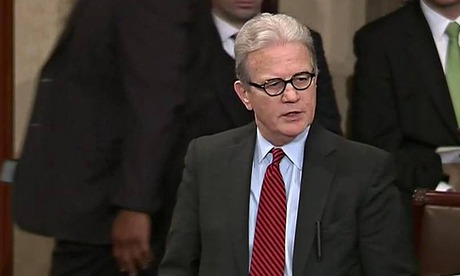
Many US businesses could find themselves without terrorism insurance in the new year and there are fears big sporting events like the Super Bowl could be cancelled after the Senate failed to extend a government programme that backstops insurers’ losses from terrorist attacks.
The Senate had been widely expected to extend the Terrorism Risk Insurance Act (Tria), introduced in 2002 when insurers were reluctant to sell coverage for New York office buildings following the 9/11 terrorist attacks.
It has been renewed twice, in 2005 and 2007, but expires on 31 December.
This means insurers can cancel terrorism cover from 1 January, and many are expected to do so as they fear insolvency in the event of a big terrorist attack with no government back-up.
The renewal was blocked on Tuesday night after opposition to a Senate vote from retiring senator Tom Coburn, a Republican from Oklahoma.
The House of Representatives had already passed the extension, which has strong support across the Senate.
The act means the government must step in if terrorism-related losses reach a certain level across the industry in any one year.
For the current bill, which now cannot be voted on again until the Senate returns in January from recess, that trigger point was increased to $200m from $100m, with government support capped at $100bn.
“The industry is pretty stunned,” said Sean McGovern, director of risk management and general counsel at Lloyd’s of London insurance market.
He testified on Tria before the US House committee on financial services last year. “There are likely to be lots of businesses and real estate owners who will find themselves with little or no coverage for terrorism attacks.”
He said this could “act as a brake on economic development. It may hamper the willingness of builders to build and lenders to lend. It’s going to make people more anxious about the consequences of a terrorist attack.”
Democratic senator Chuck Schumer warned “billions of dollars of projects and hundreds of thousands of jobs are at risk.”
After paying out $35bn related to the 9/11 attacks in what was at the time the costliest year ever, most insurers excluded terrorism from commercial policies. As a result, big construction projects were put on hold across the US.
When the Senate returns in early January, it will be controlled by the Republicans. In a best case scenario, McGovern said, it could pass the bill within the first week but it could take months if opposition grows. He noted that it had taken 18 months of debate to get to this point.
Coburn, a longtime sceptic of Tria, said his objection was to a separate provision that was tagged on to the extension bill, to set up a regulatory body to supervise insurance agents and brokers. He argued states should be able to opt out.
Howard Kunreuther and Erwann Michel-Kerjan at the Wharton School of the University of Pennsylvania warned earlier this month that Super Bowl, one of the most popular US sporting events of the year, could be cancelled. However, the National Football League was quick to insist it would go ahead. “The Super Bowl will be played,” Greg Aiello, senior vice president of communications for the NFL, told CNN and ABC News in an email. It is scheduled for 1 February at the University of Phoenix stadium in Glendale, Arizona.
Academics Kunreuther and Michel-Kerjan wrote in Bloomberg Businessweek: “You may think: No way that the Super Bowl can be cancelled! Think again. A few years ago Fifa, organiser of the World Cup, could not find insurers to cover the final game of the 2006 tournament at a cost it judged reasonable. Fifa was eventually able to structure a special financial instrument so the game could go on, but this took several months. There is considerable money at stake for the organisers of Super Bowl and for NBC, which will televise the game. No insurance, no game.”
The NFL teamed up with other sports organisations that need insurance cover for stadiums and arenas, including the National Basketball Association and National Hockey League to lobby Congress to renew Tria by the end of the year.
McGovern said: “It’s been a huge success. It hasn’t cost the American taxpayer a dollar, but the existence of Tria has given the insurance industry the confidence to provide terrorism cover.”
In the UK the government set up the Pool Re scheme with the insurance industry. Each insurer in the scheme must pay losses up to a threshold, which is determined individually for that insurer, and can claim on reserves accumulated by the industry if its losses go above that threshold. If terrorism claims exceed these reserves Pool Re can draw funds from the government, regardless of the scale of the losses.
McGovern said: “We are working with underwriters to ensure that the implications of Tria expiration are understood. Lloyd’s will continue to provide as much support as it can to its US clients during this period of uncertainty whilst ensuring that aggregation of risk is being managed.”

